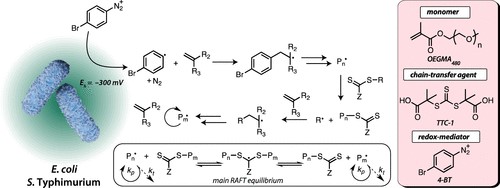News 2021–2016
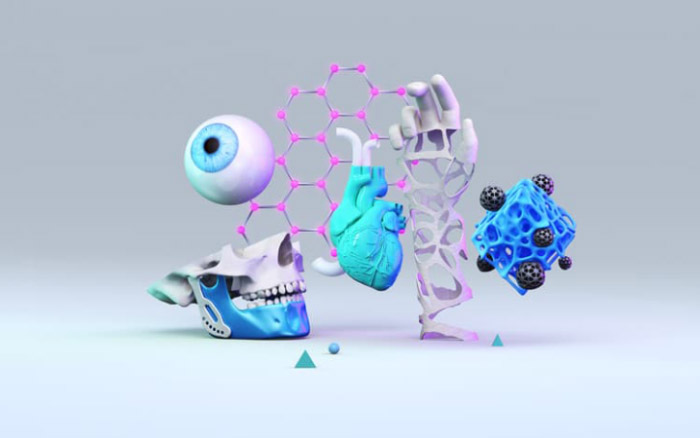
Bioengineering innovations for eye repair
September 2021
View a video of the panel discussion held on Wednesday 1 September 2021
Collaboration with Prof Dick Strugnell at the Doherty Institute
A new method has been developed via collaboration between the Polymer Science Group and Prof Dick Strugnell at the Doherty Institute for RAFT polymerisation activated by bacterial redox power. All microbes have a characteristic bulk redox potential(Eh), the degree of which is dependent on growth phase, the microbial taxa, and their physiology. This method utilize this reducing power to produce an aryl radical which then facilitates the reversible addition−fragmentation chain transfer polymerization (BacRAFT). Under this method, the polymerization rate, the degree of polymerization are controlled by the growth rate of bacterials. This bacteria-driven process (Bac-RAFT) offers new opportunities for creating engineered materials with the help of living organisms, giving new meaning to the phrase ‘living radical polymerisation’. The paper is published in Journal of American Chemical Society (2021, 143, 286) and the link is: https://pubs.acs.org/doi/full/10.1021/jacs.0c10673
A novel composite biomaterial for corneal transplantation to restore vision in patients with corneal endothelial disease
August 2020
Researchers at the University of Melbourne aim to restore vision to patients suffering eye disease. Corneal endothelial disease is a common cause of blindness, affecting over 3.2 million globally, with this number expected to rise in ageing populations.
A collaboration between University of Melbourne, the Centre for Eye Research Australia and US-based company Eversight, will test the suitability of a novel biomaterial for corneal transplantation.
Victorian Medical Research Acceleration Fund success
7 August 2020
Prof Greg Qiao will lead research into a novel composite biomaterial for corneal transplantation to restore vision in patients with corneal endothelial disease.
Corneal endothelial disease is a common cause of blindness, affecting over 3.2 million globally, with the number expected to rise in ageing populations. Researchers at the University of Melbourne aim to restore vision to patients suffering from the disease.
A collaboration between the University of Melbourne ( MSE and FVAS ), a US-based company Eversight, and the Centre for Eye Research Australia, the project will test the suitability of a novel biomaterial for corneal transplantation, bringing this technology to first-in-human application.
Method to Mimic Spider Silk
April 2020
We have developed a method to mimic spider-silk by creating localised β-sheet domains, which endow the formed bulk hydrogels with superior mechanical performance. Given the versatility of synthetic polypeptide synthesis used here, this synthetic approach can facilitate the incorporation of β-sheets in a far broader range of materials moving into the foreseeable future for advanced Materials.
The paper is published in Nature Communicaiton and the paper link is: https://www.nature.com/articles/s41467-020-15312-x#citeas
Blood-catalysed polymerization
July 2018
Congratulations to Amin Reyhani and others from the Polymer Science Group, whose recent publication on using red blood cells from sheep’s blood as the chemical catalyst for the synthesis of polymers published in Angewandte Chemie International Edition was selected by Nature as one of their weekly Research Highlights. An article on the work was also included in the most recent issue of Chemical & Engineering News (ACS). Group member Mitchell Nothling presented this work at the MACRO 2018 polymer conference in Cairns, July 2018, where it generated significant interest in the scientific community. Work is currently underway in the group to expand on this technology for the development of novel biomedical applications.
Sunshield technology in the media
July 2018
The Sunshield technology being developed at the Polymer Science Group to help tackle coral bleaching on the Great Barrier Reef has recently been featured on Channel 10’s science educational show for children, Scope. View the video: SCOPE TV: Coral Sun Shield This follows the widespread media interest in the project which was done in collaboration with the Australian Institute for Marine Science (AIMS) through the Great Barrier Reef Foundation. This project is still ongoing with the next phase involving further optimisation, larger scale testing, and initial trials to observe the behaviour of the films on the open ocean. Read the original media release.
Polymer Science Group wins Tech Connect 2018 Innovation Award

25 April 2018
Ultrasound polymerisation technology developed at the Polymer Science Group has been awarded the Tech Connect 2018 Innovation Award. The award selects top 20% of early-stage innovations from around the world, through an industry-review process. Rankings are based on the potential positive impact the submitted technology will have on a specific industry sector.
Shereen Tan Invited Speaker Tech Connect 2018
15 March 2018
Dr Shereen Tan is an invited speaker for the Materials Innovation Spotlights: Sherwin-Williams Program at Tech Connect World 2018. She will be presenting “A method to initiate radical polymerisations without exogenous initiators” on May 14.

Stories of the Polymer Science Group
December 2017
The annual publication “Stories of Australian Science, 2017” which highlights exciting innovative research from around Australia, included two of the Polymer Science Group’s recent discoveries.
Curing Blindness by Repairing Corneas with Invisible Films highlighted the patented synthesis and development of hydrogel films capable of growing corneal cells. The technology could restore the eyesight of millions of sufferers of corneal disease, through the insertion of these hydrogels via a tiny incision in the patient’s eye.
The second featured story, Using Stars to Overpower Superbugs was also reported and outlined the work Professor Qiao’s group have developed, which has created star-shaped amino acid polymers capable of killing antibiotic-resistant bacteria. The article emphasises the need for a new approach to antibiotic treatment due to the rise of the superbugs which are predicted to result in 10 million deaths by 2050, according to the World Health Organisation. The team plans to develop the formula further and plans to move to phase one human trials in the next five years.
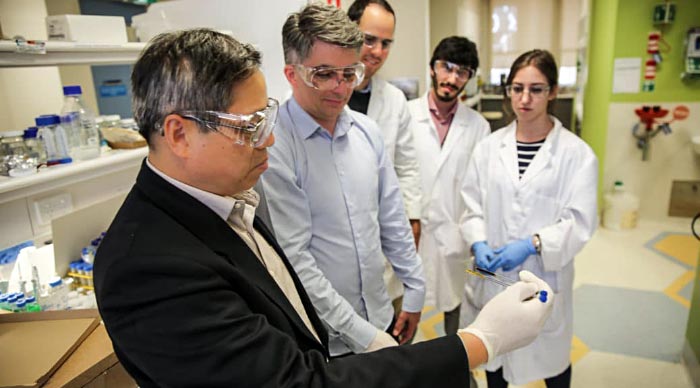
RACI Applied Research Award 2017
November 2017
Congratulations to Professor Greg Qiao on being awarded the RACIs National Applied Research Award. The Medal is awarded annually to a full member of the RACI who has contributed significantly towards the development of, or innovation through, applied research, or in industrial fields. The awards were announced at the annual awards night dinner which was held on Friday 24 November 2017.

SNAPPS make it to the Science Museum in London
November 2017
A special exhibition at the Science Museum in London is focussed on raising awareness among the general public about the global threat of antibiotic-resistant bacteria and begins with a recording of Fleming himself explaining the problem of antimicrobial resistance. The public is then greeted face-to-face with some of the world’s most problematic bacteria including Staphylococcus aureas, and other ESKAPE pathogens, safely contained within sealed containers. Further through the exhibit the viewer see’s the strategies being developed to combat these bacteria including the display by the Polymer Science Group, “Star-shaped proteins that kill bacteria”. This display explains the importance of the Polymer Science Group’s SNAPPs technology as is part of the overall exhibition entitled “Superbugs: the fight for our lives” which will be on display from Autumn until Spring 2018.
A detailed description of the exhibition was featured in Nature Microbiology, entitled “Educated Microbes “ by Claudio Nunes-Alves, 9 November 2017.
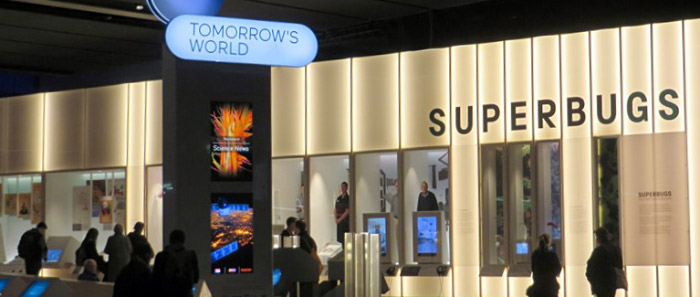
Six Grand Ideas to Fight the End of Antibiotics
October 2017
An online article, Six grand ideas to fight the end of antibiotics, produced by the BBC, detailed six of the leading strategies designed to tackle the growing rise in antibiotic resistant bacteria, one of the 21st Century’s biggest challenges. One of the strategies included “Infection-Killing Polymers” developed by the Polymer Science Group at the University of Melbourne. This article highlighted the 15 year development of star-shaped polymers initially aimed at reducing the viscosity of automotive paints and engine oils, to their current incarnation as Structurally Nanoengineered Antimicrobial Peptide Polymers (SNAPPs). These polymers demonstrated their ability to rip apart cell walls of bacteria, absorbing into the cell’s membrane and pulling out their lipid layer. Strategies by other research groups highlighted in this article included using good bacteria to fight ‘bad’ bacteria; light responsive quantum dots for antibiotic treatment; research in identifying which bacteria are responsible for antibiotic resistance; enhancing basic antibiotics to contain multiple mechanisms to kill bacteria; and finally a holistic non-profit organisation in Philadelphia which is bringing together antibiotic research from around the world to fight antibiotic resistant superbugs through a cloud based data-sharing approach.
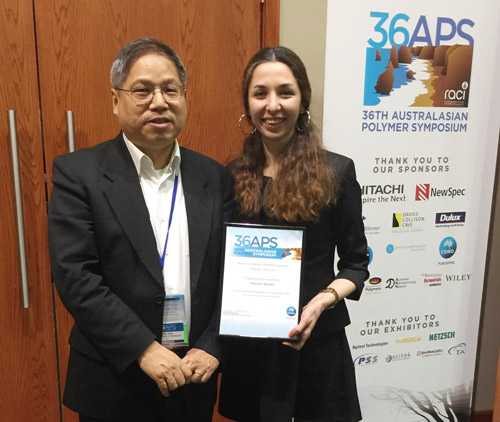
Fatemeh Karimi awarded the Eugen Singer Award
November 2016
Well done to PhD student Ms Fatemeh Karimi, who has received the Eugen Singer Award which is open to students engaged in the study of polymers, including their production and processing. The award was established by Mrs Josephine Singer in commemoration of her late husband, Eugen Singer, who distinguished himself as a chemical engineer working in the field of precision engineering associated with the production and processing of polymers. Fatemah is the third recipient of this award from the Polymer Science Group, following on past graduates Dr Andri Halim and Dr Zhou Zhang.
Fatemeh continued her success, winning the 2016 Treloar Prize for best poster presentation at the 36th Australian Polymer Symposium (APS) held at Lorne on the Victorian coast.
Emeritus Professor David Solomon receives the Companion (AC) in the General Division of the Order of Australia
September 2016
David Solomon was presented with his award at the Governor General’s Government House in Canberra by his Excellency the Honourable Hieu Van Le AC, the Administrator of the Government of the Commonwealth of Australia.
Professor David Solomon’s citation reads:
“For eminent service to science as an academic, researcher and author in the field of polymer chemistry and plastics, to the development and commercialisation of processes and materials, and to professional scientific institutions.
Professor Solomon’s lifelong dedication to revolutionising and promoting research in plastics has led to many life-enriching discoveries, and has inspired a generation of younger scientists.
The research groups he established are internationally renowned and continue to lead the development of ground-breaking scientific solutions. His advocacy for fostering linkages between academia and industry has greatly enriched the Australian scientific community.
At a time when Australia is looking to inspire a new generation of entrepreneurs and spark a significant lift in the level of commercialisation of research, Professor Solomon is a fine example of the best of who we are. Professor David Solomon – Appointed a Companion of the Order.”
Prof Qiao also attended the investiture in support of his long standing colleague, mentor and friend. Emeritus Professor David Solomon has played an important role as the Polymer Science Group Advisor since its inception in 2000, and has been involved with various industrial collaborations with BHP, Orica, DuPont, the CRC-Polymers and most recently the Great Barrier Reef Foundation.
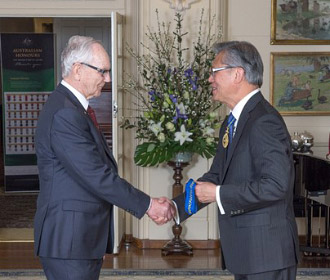
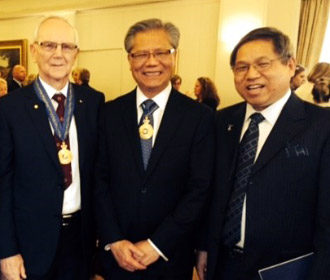
Nature Microbiology Publication: Combating Superbugs with Star-Shaped Peptide Polymers
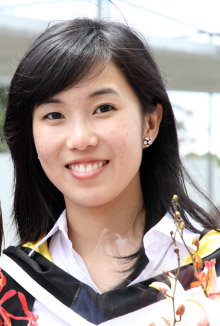
September 2016
Congratulations to Shu J. Lam, Professor Greg Qiao and others from the Polymer Science Group for their publication in Nature Microbiology. As part of Shu’s PhD project, the publication reported the discovery of a new class of antimicrobial agents, in the form of star-shaped peptide polymers that have in vitro and in vivo efficacy against multidrug-resistant Gram-negative pathogens without observable resistance development, while possessing high selectivity indices. The work was done in collaboration with Associate Professor Neil O’Brien-Simpson and Professor Eric Reynolds from the Melbourne Dental School and the Bio21 Molecular Science & Biotechnology Institute. The impact of this work led to a lot of media interest in the project with major national and international media outlets reporting on the research findings.
Media coverage included:
- The Melbourne Newsroom
- Sydney Morning Herald
- The Age
- SBS News
- ABC News
- Huffington Post UK
- TV & Radio: ABC News 24, ABC Radio, 2GB, 2SM, 2UE, 2SER, Astro AEC Malaysia
Dual Winners of the Loxton Boger Award
August 2016
Congratulations to both Ms Stephanie Allison and Mr Bingxin Liu, who were recently awarded the Loxton and Boger Awards, awarded to academically excellent students in the first year of their PhDs. They are the first recipients of this prestigious award from the Polymer Science Group.
Fresh Science: Curing Blindness by repairing corneas with invisible films
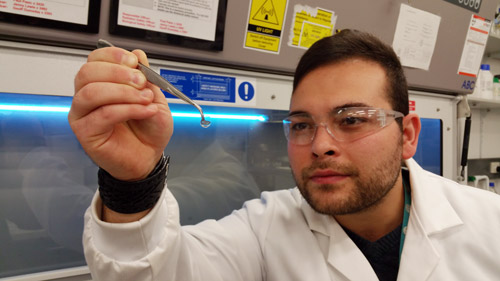
August 2016
Congratulations to Dr Berkay Ozcelik, the Victorian winner of Fresh Science, for his work on hydrogel supported corneal implants aimed at overcoming the worldwide shortage of donated corneas. During his PhD, Berkay developed the synthetic hydrogel film used to culture new corneal cells at the Polymer Science Group (the University of Melbourne), working with the Centre for Eye Research Australia.
“The hydrogel film we have developed allows us to grow a layer of corneal cells in the laboratory,” says Berkay. “Then, we can implant that film on the inner surface of a patient’s cornea, within the eye, via a very small incision.”
Once in place the new cells restore the cornea’s vital water-pumping activity, so that the cornea once more becomes transparent. As part of the Fresh Science award, Berkay appeared on various media outlets including the ABC, channels 7, 9 and 10 explaining his recent technology and outcomes. Fresh Science is a national program helping early career researchers find a share their discoveries, and is supported by Museum Victoria, CSIRO, Deakin, Monash, RMIT, Swinburne universities, the University of Melbourne and New Scientist.
Media coverage
- From the Fresh Science website: Curing blindness by repairing corneas with invisible films
- YouTube: 9 News
- YouTube: 10 News
- YouTube: ABC News
- YouTube: 7 News
- News Online
- International Business Times
- ABC online
- ABC The World Today
- Nine News online
- Tenplay online
- BioPortfolio News
- ABC News 24
- ABC Radio
- 3AW
- Lab + Life Scientists
